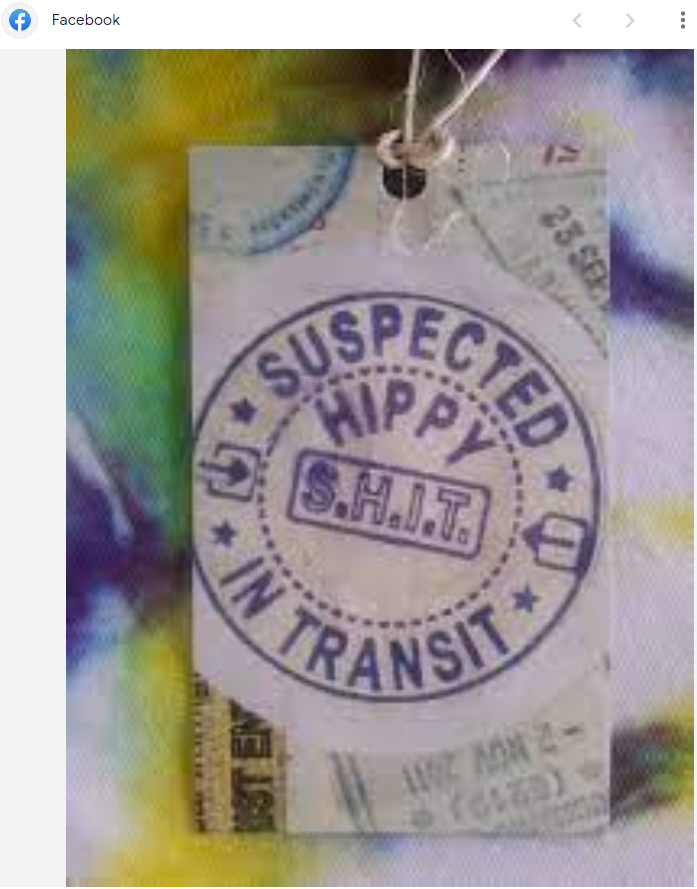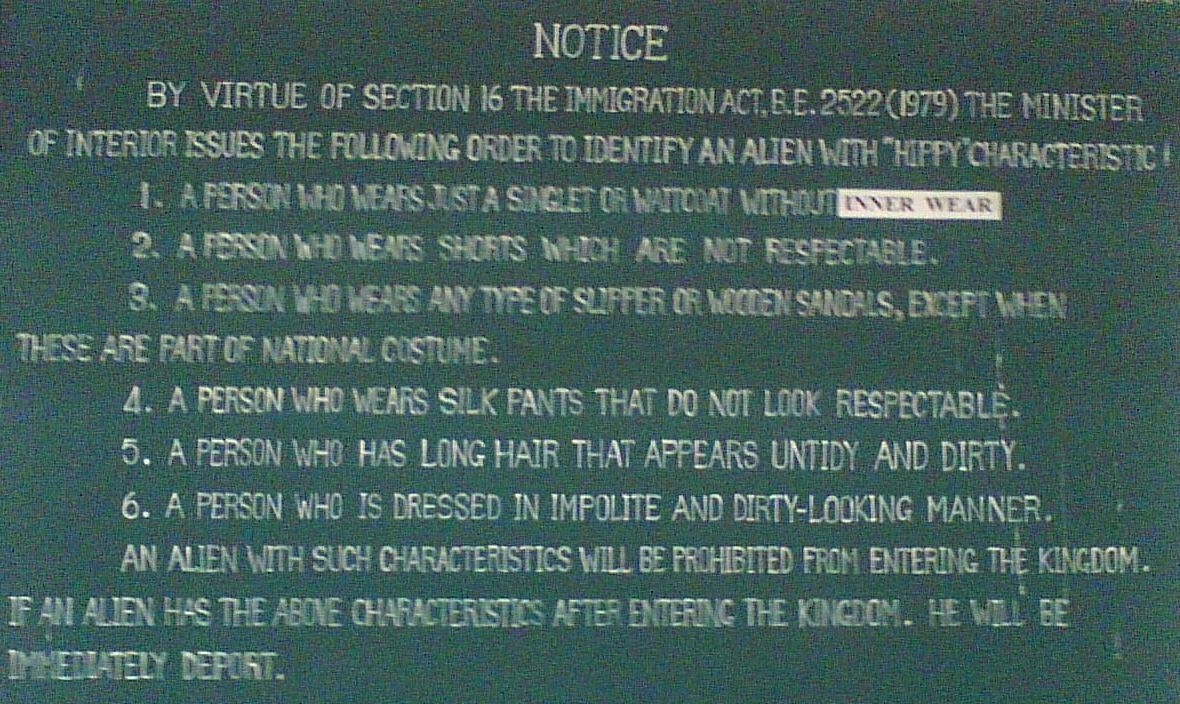It's difficult to conclusively prove a negative like this, but this one does seem much more likely to be an urban legend than not, although it's probably based a number of related facts.
First, I could only find one image in Google Images of this alleged stamp, and it looks suspicious to me because (1) it's not even on a full passport page but what seems to a chunk thereof turned into some kind of hangable art, and (2) it's a sticker stamp, but Malayesia doesn't seem to use those. They use "normal" ink stamps base on every other example I've seen, albeit these are not from the 1970s.

Based on the latter (video) source, they did/do seem use a bunch of other acronyms on stamps for people to be refused entry, including NTL ("Not To Land"), BLI ("Black List Immigration"), RAI ("Refuse All Immigration") etc., but not "SHIT". In fact, "NTL" is also confirmed on a government website:
There has been an increase number of International Students that have been denied entry into Malaysia due to non-adherence to the requirements set by the Government of Malaysia. These students are subsequently issued with a notice of ‘Not To Land’ (NTL) upon arriving in Malaysia and are deported back to their country of origin.
As for historical sources, this is where we get to the related facts. It was Singapore which had rather more famous ban on long hair, which included in 1978 a government minister noting in a newspaper that:
620 people were refused entry into Singapore for having long hair and 801 were allowed to come in only after they had shorn their locks.
Malaysian authorities also disliked long hair, but apparently didn't go as far as denying tourists entry based [just] on that. (Or at least I could find no official confirmation of such a policy in Malaysia.) On the other hand, they did ban at least TV shows exhibiting "long hair rockers" in the 1990s. According to another source some rock concerts (instead of just TV shows thereof) were banned as early as 1986 in Malaysia, but that ban was short lived. OTOH some foreign bands were banned [or prevented] from performing much later, e.g Megadeth in 2001 or Kreator in 2014.
There is one NYT story from 1970 which says (slightly ambiguously)
Over the last few months Asian officials in Malaysia. Singapore, Taiwan and the Portuguese territory of Macao as well as in Thailand and Indonesia have declared war on long hair. Some have linked long hair to crime; others have denounced it as a symbol of undesirable Western culture.
Two Americans who recently arrived at the causeway linking Malaysia and Singapore were told by immigration officials that they would not be welcome without a haircut. They did not consider their hair exceptionally long but the officials were adamant. The Americans were directed to a nearby barber and welcomed to Singapore with a smile afterward.
Singapore Bans ‘Hippies’
The Singapore Government has banned entry to all persons who in the opinion of its of lidials fit the description of “hippies,” [...]
Although the lead sentence in that quote covers a bunch of countries all allegedly having this policy, only Singapore is then detailed as having enacted something. Taiwan's more tentative steps are mentioned in some detail:
A Taiwan official, Chang Han‐kuang, recently cited five points of personal appearance that “violated police regulations.” Offenders were men with untrimmed beards or long hair, or who wore women's clothes, shoes or ornaments, and women who wore revealing clothes or clothes “liable to attract excessive, attention.”
Mr. Chang, director of the Taiwan police department's foreign affairs division, said alien offenders would first be warned and later be liable to deportation.
Denial of Visas Urged
Mr. Chang added that his department had asked Taiwan diplomatic missions to refuse visas to applicants with long hair.
I'm not sure what Taiwan did (if anything) in the aftermath. But there's nothing more detailed about Malaysia in that story, except:
Malaysia, according to the Home Affairs Minister, is considering legislation to keep out people who do things “contrary to our Eastern way of life. Letting one's hair grow long, never a cause for concern before it became a Western fad, is one of these things.
So apparently, they might have considered a similar ban. They probably enacted a (hair length) policy in public schools at one point, according to one 2019 article, talking about its [proposed] reversal. OTOH, the state of Sabah, which is one of the states that make up Malaysia, did seemingly have a law that prohibited something in relation to long hair, but I'm not totally surely exactly what--possibly even the entry of other Malaysians with long hair into Sabah, between 1974-1976:
The Sabah State Legislative Assembly yesterday repealed the Recreational and Entertainment Facilities (Restriction on Use) Enactment, 1974 when it passes the Recreational and Entertainment Facilities (Restriction on Use) (Repeal) Enactment, 1976.
In winding up the debate on the Bill, the State Minister of Culture, Youth and Sports, Pengiran Othman Rauf, said Sabah was the only State in Malaysia which had such laws.
The presumption the Bill that long hair was associated with bad character was not correct, he said.
There were a number of natives living in interior parts of the State who had long hair but they were not “bad hats” the Minister told the House.
The sporting of long hair, by youths especially was more of a fashion fad which would disappear according to the times.
USNO Member for Bongawan Datuk Haji Dzulkifli Hamid (pic), in opposing the Repeal Bill, said he feared that it would open the door for western cultural influences to enter the State and sap the moral character of youths.
He said in order to prevent such an undesirable situation, it was better to have regulations against long hair.
Datuk Haji Dzulkifli claimed that from social studies, it was found that those sporting long hair were drug addicts and bad characters.
The Government member for Matunggong Encik Michael Wong, said the laws inconvenienced people from Peninsular Malaysia and Sarawak coming to Sabah. [...]
The Berjaya Member for Langkon, Encik Michael Madinal, said there was no guarantee that banning long hair would reduce crime rate.
UNSO lost power/majority in Sabah in the 1976 state election.
One interesting point about Malaysia though is that (some) states thereof retain their own immigration authority, it seems:
there are four different jurisdictions that adjudicate immigration matters in Malaysia, depending on the intended work location: the immigration departments in West Malaysia, the Federal Territory of Labuan, Sabah and Sarawak.
So, it's perhaps somewhat plausible that Sabah would have denied some long-haired tourists entry between 1974-1976. Whether they applied any (specific) stamps for that issue though... I can't say at the moment.
That Sabah law was perhaps pre-emptively enforced as an executive as early as 1973 though, but not on foreigners, apparently, at least at that point:
Operation Snip begins
AUGUST 21 1973: Barber shops were doing brisk business as “Operation Snip” went into effect at 8pm on Sunday, following Chief Minister Tun Datu Mustapha’s directive to Police Commissioner Tuan Mohd Yusof Shah bin Jaffar on Friday in Kota Belud to take stern action on long-haired youths.
More than 70 youths were rounded up in town and taken to the Kota Kinabalu police station to have their hair cut. [...]
The youths had the choice of having their hair cut by police or by professional barbers. But due to the costly RM3 charged by barbers, many opted for the police barbers who cut for free, although much shorter than the barber do.
No Malaysian youth with long hair was spared in the operation which however did not apply to foreigners.
In Tawau, some 70 youths sporting long hair were “ambushed” by police at the Community Centre on Saturday night where they had been watching the district boxing championships. The same was the case at cinemas.
FWTW, I also checked the fabled Lonely Planet's Accross Asia on the Cheap in the E-book version though, although it claims to be the 1973 text. And it says
Singapore:
VISAS: Not required for commonwealth or U.S. visitors but if you are one of those
unwanted ‘hippies’ you may have severe limits placed on your permitted length of stay.
Malaysia:
VISAS: As in Singapore you are not required to have a visa but your stay will be
limited if you are an undesirable. [...]
The most visited ‘other’ country is Laos. Visas can be obtained in Bangkok but
Laos is having an anti-hippy drive so look good.
So it is somewhat similar in claims to the NYT piece, but a bit more definitive about Malaysia than NYT was (in 1970). OTOH the 1973 Lonely Planet guide says nothing about specific passport stamps (hipplie, SHIT, or otherwise) being applied... in any of those countries! It does say something about being careful with other passport stamps, e.g.
When crossing into Indonesian Timor the onus is on you to ensure your
passport is entry stamped. Hassles later if it isn’t. [...]
Bangladesh: Remember that
relations with Pakistan are still very bad, if you get Bangladesh stamped in your
passport you’ll have to get a new passport in Delhi before entering Pakistan.
So, if Tony Wheeler made that claim, it wasn't in this first book of his company.
OTOH, in 1980 he published another, similar book (also via his company), South-East Asia on a Shoestring [presented as an updated version of earlier "yellow book"--but this is much longer at some 300 pages], this time saying (p. 156):
Malaysia, VISAS: The maximum stay on initial entry is
14 days, easily renewed. Visas are not
necessary for most western
nationalities but Malaysian immigrations
are attempting to outdo Singapore
and can be nasty at initial entry. lf they
want to be super unpleasant they can
brand you a "suspected hippy" and give
you a transit pass that cannot be converted
into a visit permit. They can be
equally officious and unpleasant when it
comes to renewing. Look clean, neat
and affluent and all should be well
So this is probably where the "suspected hippy" claim first appeared, but notice it's a little different than the claim in the ICWA report in the other anwer. Wheeler doesn't say "suspected hippy in transit", although he does say a hippie might only get a transit pass instead of a visa.
You can easily find images of such transit passes [for Malaysia] on the web, but they obviously have neither hippie nor SHIT in them. As for effect, they seem to be more less equivalent to a deportation/leave order, so they'd have served their purpose of turning a "hippie" back...:
A Transit Pass is issued to foreign nationals who are transiting through Malaysia and are staying in the airport transit area. This means they cannot leave the airport and must stay within the designated transit area until their next flight.
Although I'm not totally sure how that would have worked for other entry points, like rail.
Likewise, a 1974 issue of The Bulletin says that
In 1972, 22 "suspected hippies" were refused entry to Malaysia and 144 were refused an extension of stay. Forty-five were banned in 1973 and 139 were refused an extension.
Alas, I don't have access to the full article right now, only a GBooks snippet.


